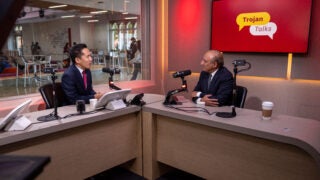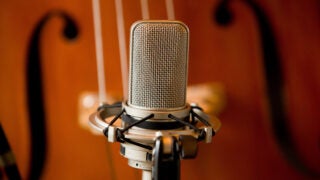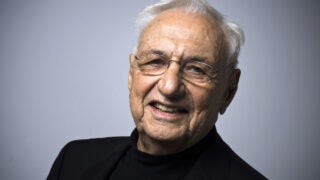In memoriam: USC trustee, entrepreneur Alfred E. Mann, 90
Entrepreneur dedicated himself to developing technologies that dramatically improve patients’ lives
USC Life Trustee Alfred E. Mann, a world-renowned humanitarian and entrepreneur who founded 17 companies in the aerospace and biomedical technology industries, died Feb. 25. He was 90.
Throughout his distinguished career, Mann dedicated himself to developing technologies that dramatically improve patients’ lives. His companies produced and marketed products such as pacemakers, cochlear implants and retinal implants that revolutionized health care, and touched countless lives around the world. Most recently, Mann was chairman and chief executive officer of MannKind Corp., a biopharmaceutical company that pioneers therapies and drug delivery technologies for the treatment of diabetes, metabolic disease and cancer. He stepped down as chief executive officer in January 2015 and as chairman of the board this month.
Mann’s keen insight and vision profoundly influenced innovation in biomedicine at USC, enabling the university to propel discoveries that would benefit the world. In all, he donated more than $174 million to USC to advance its contributions to human health. His support established the Alfred E. Mann Institute for Biomedical Engineering, which invests funds to accelerate the commercialization of bioengineering or medical inventions.
Alfred Mann built a towering legacy — not only at USC, but throughout the world.
C. L. Max Nikias
“Alfred Mann built a towering legacy — not only at USC, but throughout the world. He distinguished himself as a visionary entrepreneur and philanthropist, and improved the day-to-day health of millions of people everywhere,” said USC President C. L. Max Nikias. “At USC, the Alfred E. Mann Institute has dramatically expanded the university’s interdisciplinary focus on biomedical engineering research and education, and has brought this focus into more applied areas of biomedical device technologies and technology transfer. Indeed, Mr. Mann’s place in USC’s history is both exceptional and enduring.”
Passionate about health
When his historic gift to USC was announced, Mann spoke of the significance of building a bridge between a preeminent research university and private industry, one that would enable academic research to translate quickly into medical products. “USC is a great university with strengths in biomedical, bioengineering and extensive basic research,” he said, “and it has the kind of entrepreneurial spirit it takes to bring private industry and higher education together in a common purpose.”
Throughout his life, Mann remained passionately dedicated to bettering lives, and continued to work long after most of his contemporaries had retired. The companies he founded reflect his philosophy of finding technological solutions for chronic conditions.
The institute has been instrumental in developing several medical products. Among them is Argus II, the world’s first artificial retina approved for use in the United States and the European Economic Area. Produced by Second Sight Medical Products, a company founded and chaired by Mann, the device restores some vision to people suffering from total blindness caused by the disease retinitis pigmentosa. The retinal implant won FDA approval in 2013.
Other revolutionary medical devices created and marketed by Mann’s ventures included insulin pumps, glucose sensors, devices to restore movement to paralyzed limbs, and high-energy density batteries and electronic assemblies for medical device, military and aerospace industries.
A self-made entrepreneur
Mann was born and raised in Portland, Ore., as the middle son of immigrant parents. His mother, a pianist and singer, was from Poland and his father, a grocer, was from England. After high school, he spent a few years in college before joining the Army Air Corps during World War II.
After the war, Mann moved to Southern California. Mann earned his bachelor’s and master’s degrees from UCLA in 1949 and 1951, respectively, and started his first business, Spectrolab, in 1956. Spectrolab provided the U.S. Army with guidance equipment for anti-tank missile systems and, later, the solar cell power arrays for spacecraft.
Mann served on the USC Board of Trustees since 1998, and was a member of the National Academy of Engineering, one of the highest professional distinctions for engineers. He was awarded honorary doctorates from USC, Johns Hopkins University, Western University of Health Sciences and Technion—Israel Institute of Technology.
Mann is survived by his wife, Claude, and children Brian, Howard, Richard, Carla, Alfred Jr., Kevin, and Cassandra.



